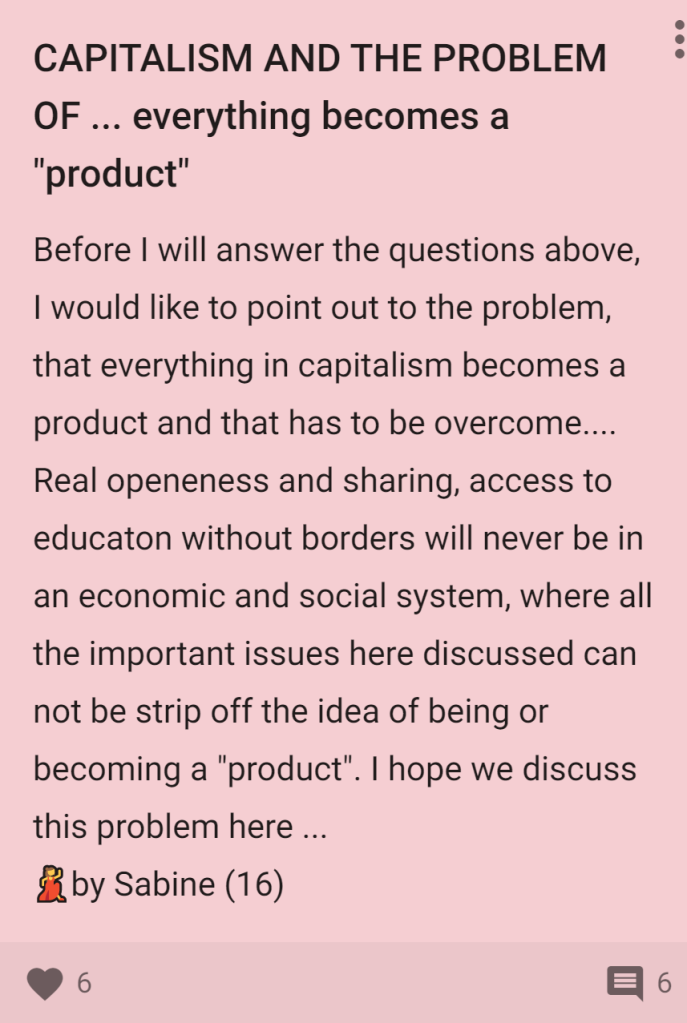That is the message to be learned as the part of the course. Looking in my reflection diary at that time I felt „brainwashed“ and „stalked“ from the provider of the tools I have tried. Worldpress would not give up to overload me with advertisement, padlet was only free for three padlets; I faced borders as soon as I tried more than the simplest version of the tools… I was the product. We discussed it in the group, if we can join the free course in exchange to get us caught in the many „possibilities“ (on sale)? I post here my post from the shared padlet of the topic and will commend here on some comments from follow learners.

The first comment: „…. We could do so many great things if we learned to work together instead of being driven by greed and competition. However I think one great achievement of openness is Wikipedia. That could never have been written as a commercial venture.“
My comment: Growing up in a socialist country (GDR) I learned to work together very well and when the wall broke down, I had to learn that a „collective“ (with solidarity in mind) became a „team“ (not with solidarity in mind). I had some strong arguments with Wikipedia – especially about school in the German Democratic Republic – and learned, that Wikipedia is far from „independent“.
Second comment: „….I think it is very important aspect to ponder up on. I would think about it, but the first thought to me was that I may want to look at my creation are ‚in the process‘, not as ‚final product‘.“
My comment: That process is the „product“; Buddhism is „selling“ this idea pretty well.
Third comment: „…. We live in a capitalistic society but one product that is more and more often free, is in fact education. I think that access to internet, knowledge of the english language, literacy are prerequisites for being able to access the open learning – but the fact is, it is free of charge. It will give power to those that normally do not have power and I think this can lead to social change.“
My comment: Sure, I also use the free opportunities and recommend it to others. Gives it more power to people and lead to social change? Let us hope. The narrative of the Silicon Valley, that „Education is broken“ (in: Martin Weller; 2014; The Battle for Open – How openness won and why it doesn’t feel like victory; p. 117 – 133) is critically analysed on page 131 of that interesting book: „…. there is a battle for narrative in open education, and that narrative will have a strong influence on the future direction it takes. If MOOCs are the most prominent aspect of open education, then the narrative associated with them will create an impact for other aspects. If the dominant narrative is that of Silicon Valley, then this frames what is deemed the appropriate model for other forms of open education. If you wish to create an open course, then the model for doing so and criteria for deciding what it should achieve has been determined to serve the needs of this overriding weltenschauung.“
Fourth comment: „….we should be much more reflective in regard what we are actually sharing when we are sharing. In MOOCs the dominance US universities with high brand value dominate and in addition to courses they are sharing a world view, educational policy etc. Further, what is free now, might not be free in the future. I wonder are MOOCs a new way to monetarize on education in the future.“
My comment: I would like to add to that forseeing of „monetarize on education in the future“: If we let an economic organization (OECD) forces our educational system via PISA shocks or a like into radical turns – as it is done already and not in the future – we have an idea, what could be the future…